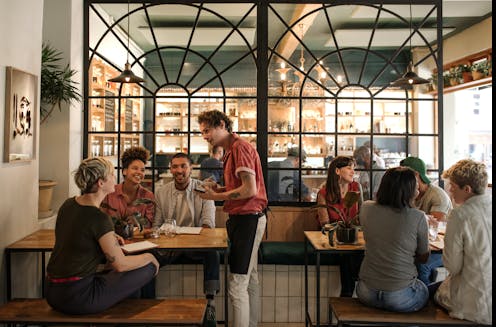What kind of diner are you? 6 types of diners who avoid plant-based meat dishes
- Written by David Fechner, Research Fellow, Social Marketing, Griffith University

Imagine having dinner at a restaurant. The menu offers plant-based meat alternatives made mostly from vegetables, mushrooms, legumes and wheat that mimic meat in taste, texture and smell. Despite being given that choice, you decide to order a traditional meat or vegetable dish. That’s a common decision.
The Australian plant-based meat industry has grown significantly in recent years and has been projected to become a A$3 billion industry by 2030[1]. Yet most consumers still hesitate to order a plant-based meat dish in restaurants.
In our new study[2], we asked 647 Australians why they don’t order plant-based meat dishes when dining out.
It turns out not everyone shares the same reasons. We found six types of diner who avoided these dishes.
Read more: Is fake meat healthy? And what's actually in it?[3]
The 6 types of diner
Type 1: environmentally conscious, plant-based meat eater
The environmentally conscious plant-based meat eater doesn’t have any issues with meat alternatives. In fact, they enjoy experimenting with plant-based meat products at home. They have their favourite brands but also dislike certain products.
To avoid eating a product they don’t like, they prefer ordering traditional vegetable dishes when dining out. They are more concerned about protecting the planet than their own health.
Type 2: health-conscious, plant-based meat supporter
Type 2 is similar to type 1, except type 2 diners care about being fit and healthy. They prefer to “just eat the vegetables they use to make the fake meat”, as one study participant told us, because they think meat alternatives contain too much sodium, soy, fat, sugar and genetically modified ingredients.
Read more: We looked at 700 plant-based foods to see how healthy they really are. Here's what we found[4]
Type 3: curious plant-based meat avoider
The curious plant-based meat avoider typically orders a meat dish and occasionally a vegetable option. They sit on the fence when it comes to plant-based meat.
While they are curious to try it, they aren’t familiar with it and don’t want to risk disappointment. As a type 3 diner told us:
If I were offered a sample, I would be more inclined to try it but […] the risk of it being disappointing doesn’t justify the cost.
Type 4: sceptical plant-based meat avoider
Like the curious plant-based meat avoider, type 4 diners order more meat than vegetable dishes. They believe meat alternatives are unhealthy because “reading the back of plant-based meat packages will typically reveal a plethora of chemicals”. They don’t trust the technology used to create plant-based meat.
They also do not support the idea of mimicking meat with plants and giving these products names similar to animal meat such as burger or steak.
Type 5: indifferent meat lover
The indifferent meat lover doesn’t have any issues with plant-based meat. Yet they wouldn’t consider ordering a plant-based meat dish. Eating meat is an integral part of their restaurant experience and they “wouldn’t know how you’d mimic meat sliding off a bone”.
Although most of their family and friends also order meat dishes, they have no problem with restaurants offering meat alternatives if they are clearly labelled and don’t limit meat options. They believe eating meat is natural, summed up by one who said:
There is a nutritional requirement for animal meat inherent in humans.
Type 6: critical meat lover
The critical meat lover dislikes everything about plant-based meat. They don’t understand why anyone would replace meat with a plant-based alternative, nor why it is important.
Several times I have eaten this garbage […] and thoroughly regretted it.
Read more: Meat and masculinity: why some men just can't stomach plant-based food[5]
Why does this matter?
As David Attenborough says[6]: “We must change our diet. The planet can’t support billions of meat-eaters.”
Occasionally ordering a plant-based meal instead of a meat dish can greatly reduce the environmental footprint of the global food system. Animal agriculture[7] accounts for 56% of food-related greenhouse gas emissions but produces only 18% of calories and 37% of protein.
Plant-based alternatives[8] to chicken, pork and beef emit, on average, 43%, 63% and 93% less greenhouse gas emissions.
This means a family of four ordering plant-based meat burgers instead of beef patties saves carbon emissions equal to driving from Brisbane to the Gold Coast.
Read more: A 'war on red meat'? No, changes to Australian dietary guidelines are just a sensible response to Earth's environmental woes[9]
5 ways restaurants can promote plant-based meat dishes
Restaurants are the perfect tasting ground to introduce diners (especially curious and sceptical plant-based meat avoiders) to meat alternatives. Here are five simple things restaurants can do to promote plant-based meat dishes:
hand out free samples to reduce the fear of disappointment
serve plant-based meat by default to break meat-ordering habits, as a Brisbane pub[10] has done
describe plant-based meat with indulgent words[11] and avoid using unappealing language, such as the word vegan
provide health information to overcome the belief that meat alternatives are unhealthier than meat, which is often not true[12]
integrate plant-based meat dishes into the full menu rather than listing them in a separate vegetarian section.
References
- ^ A$3 billion industry by 2030 (www.foodfrontier.org)
- ^ new study (www.tandfonline.com)
- ^ Is fake meat healthy? And what's actually in it? (theconversation.com)
- ^ We looked at 700 plant-based foods to see how healthy they really are. Here's what we found (theconversation.com)
- ^ Meat and masculinity: why some men just can't stomach plant-based food (theconversation.com)
- ^ David Attenborough says (www.independent.co.uk)
- ^ Animal agriculture (www.science.org)
- ^ Plant-based alternatives (www.frontiersin.org)
- ^ A 'war on red meat'? No, changes to Australian dietary guidelines are just a sensible response to Earth's environmental woes (theconversation.com)
- ^ Brisbane pub (www.netherworldarcade.com)
- ^ indulgent words (www.sciencedirect.com)
- ^ often not true (onlinelibrary.wiley.com)

















